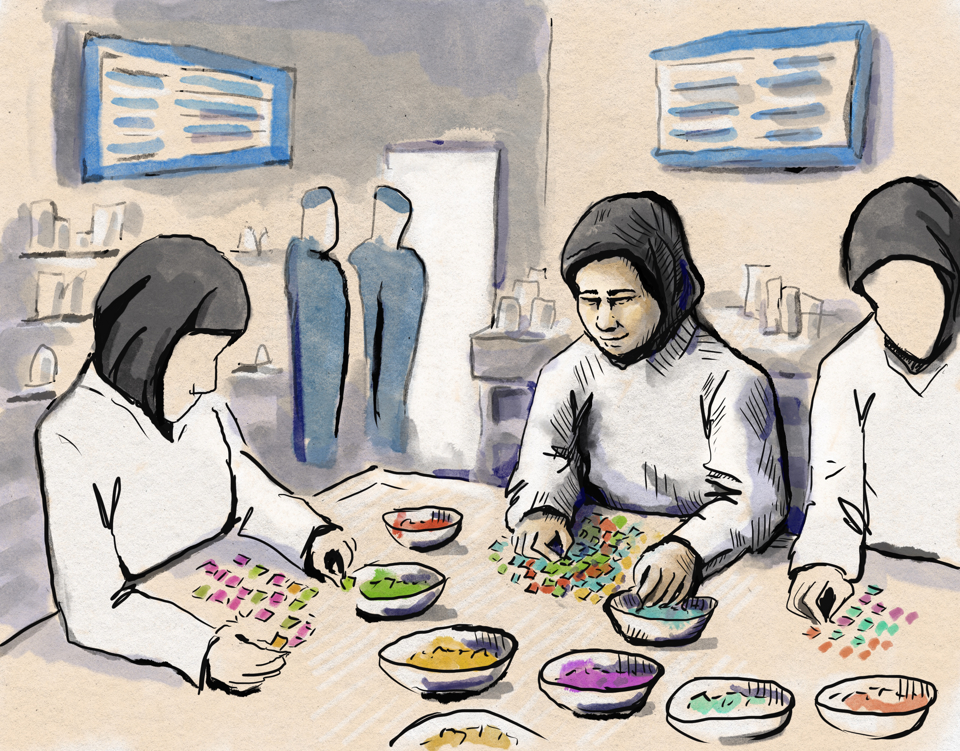A female inmate’s journey towards reintegration amidst COVID-19 in Palestine
Date:
The provision of mental health and reintegration support services for women in detention is critical to ensuring their rehabilitation. A joint programme by UN Women, UNDP and UNICEF in Palestine is supporting such interventions in a manner that empowers women and make them able to cope with new challenges -such as the COVID-19 crisis- in constructive and positive ways.

Around 100 women are currently detained across the State of Palestine, according to the Ministry of the Interior, including about 50 in three Reform and Rehabilitation Centers located in the West Bank. Nada*, a 49-year-old mother of two, is one of them. She was in her thirties when she was sentenced to spend over a decade in prison. However, with the end of her term drawing near, Nada, like many others, started to feel the challenge of regaining her freedom and did not feel prepared to start a new life.
“As a result of my imprisonment and a difficult relationship with my family, I have had many psychological issues, such as persistent anxiety, difficulty to sleep and a general feeling of being removed from reality. I had been suffering from low self-esteem and self-confidence, and all this had made me unable to communicate with the world around me.”
This is when she heard from a fellow inmate about help provided by the Treatment and Rehabilitation Center for Victims of Torture (TRC). Supported by the Joint Programme Sawasya II: Promoting the Rule of Law in Palestine by UNDP, UNICEF and UN Women, the Center provides psychotherapy and counseling to women in detention in the West Bank to help them cope with their situation and to develop the necessary skills to prepare them for reintegrating in society upon their release.
“I started to receive counseling through individual and group sessions with other inmates. But what helped me the most were the many activities TRC organized for us. I learned the craft of mosaic, embroidery, weaving and beading and started to produce pieces that I would then market, sell and generate income from” she says. Thanks to TRC’s support, Nada was able to start a new phase, where she feels safe and secure, in a path of self-acceptance and independence.
As part of their approach to mental well-being, TRC started fitness classes in the facilities with the help of an instructor. Nada and other inmates participated very actively in these sessions until COVID-19 restrictions cut them off from the outside world.
The pandemic brought uncertainty and fear of losing loved ones and restricted the women’s access to basic goods normally provided by family members during their visits. In addition, the inmates’ lawyers and therapists were not able to visit them, while the closure of the courts slowed the resolution of cases.
Instead of giving in to the stress and anxiety of the situation, the inmates joined forces and supported each other during this difficult time. They picked up where the TRC coach had left and started to organize fitness classes among themselves.
In parallel, with support from Sawasya, TRC provided face masks and sanitizers to inmates, and initiated awareness and prevention campaigns to reduce virus transmission. TRC also made sure that inmates were granted individual access to counselors and were provided with top-up phone vouchers to maintain contact with their loved ones.
It is clear that this support is helping Nada to cope with detention and prepare for her new life. “Thanks to TRC, I am now able to have ambition for myself and to face life with positivity,” she says.
* The name of the inmate has been changed to protect her identity.